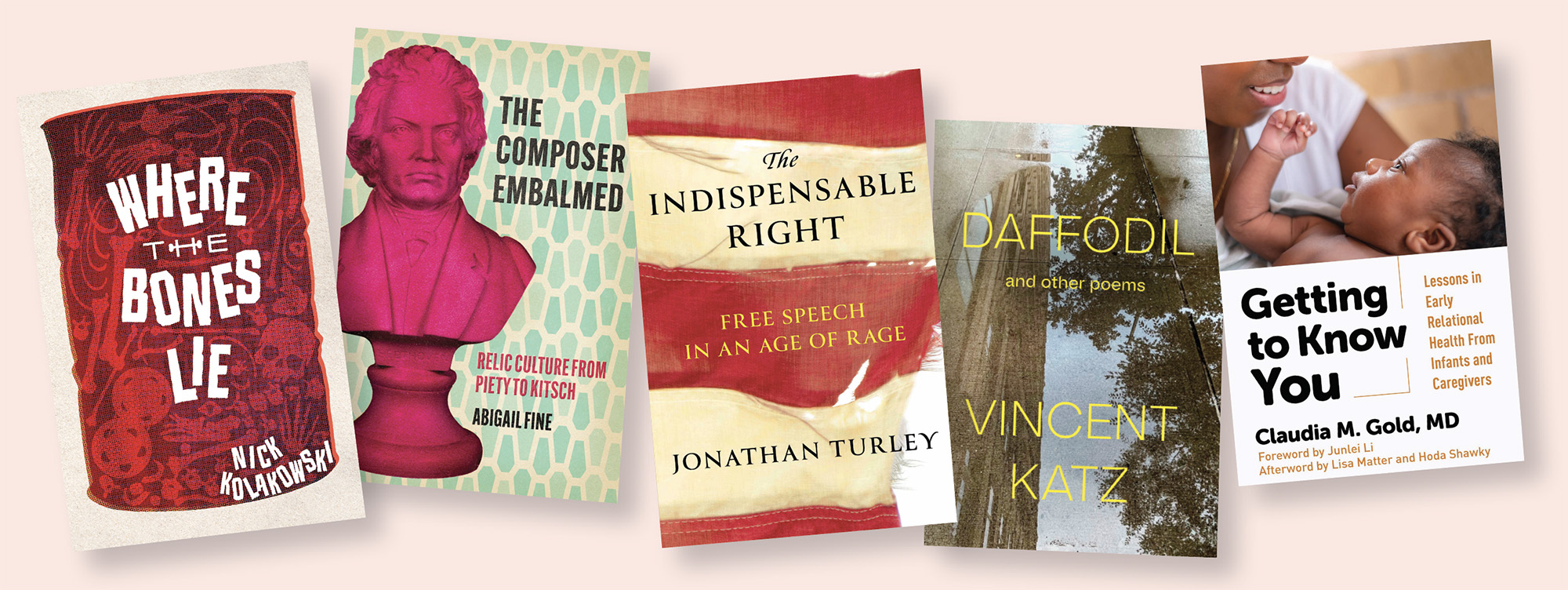
A selection of books, films, and recordings by UChicago alumni.
Where the Bones Lie
By Nick Kolakowski, AB’03; Datura, 2025
Nick Kolakowski’s debut novel follows Dash Fuller, who in a past life was “the terror of paparazzi everywhere,” hired to keep Hollywood’s secrets from the public eye. Now he’s cynical, barely making ends meet, and half-heartedly performing stand-up comedy. He finds purpose again when he meets Madeline Ironwood, the daughter of a notorious criminal whose remains have just been found—20 years after he went missing. Dash agrees to help Madeline find her father’s killer, and their search leads them into the heart of a conspiracy involving some of the most powerful people in Los Angeles.
The Composer Embalmed: Relic Culture from Piety to Kitsch
By Abigail Fine, PhD’17; University of Chicago Press, 2025
The collection and display of composers’ possessions and body parts, as well as mass-produced representations of these artists, comprise what Abigail Fine calls relic culture. In the late 19th and early 20th centuries, devotion to relics helped solidify the place of composers like Beethoven, Mozart, Liszt, and Schubert in the Western canon. By studying how people interacted with relics, Fine shows that this canonization process was more complex than it might seem. While institutions enshrined these figures as cultural leaders by collecting their relics in museums, the public availability of relics and representations of these composers also allowed ordinary people to form intimate, spiritual, even whimsical personal relationships with them and their music.
The Indispensable Right: Free Speech in an Age of Rage
By Jonathan Turley, AB’83; Simon and Schuster, 2024
We live in an era in which political engagement is characterized by rage, writes law professor and legal commentator Jonathan Turley, and so did the founding fathers. Such periods can bring censorship and suppression, often compounded by public pressure, that test the right to free speech. Turley asserts that throughout the history of the United States, free speech protections have often failed during times when emotions run high in the political sphere. He takes a broad view of legal history from the nation’s founding to the present to explore how the First Amendment has been tested and interpreted at crucial moments in American history.
Daffodil and Other Poems
Vincent Katz, AB’82; Alfred A. Knopf, 2025
In spare verse, Vincent Katz sketches the cityscapes and other man-made spaces we occupy, highlighting chance connections with others and with nature. The smallest breaks from the busy urban environment—a distant strain of music, the scent of people smoking on a park bench, clouds passing silently in the breeze, “a bird’s chewing tweaks”—call for reflection and empathy. Katz writes in a wistful tone about the need to pay attention to these brief encounters that make up our lives: “This is the time of life / That is good / It is passing and / At the same time here.”
Getting to Know You: Lessons in Early Relational Health from Infants and Caregivers
By Claudia M. Gold, AB’83, MD’87; Teacher’s College Press, 2025
The relationships children develop in their first years of life are important for their future emotional and behavioral health. Pediatrician Claudia M. Gold offers a guide for professionals working with young children to help them better support the formation of those crucial bonds. Though these practitioners, who include early childhood educators, pediatricians, doulas, and mental health clinicians—as well as parents and policymakers—may feel they should always know the right thing to do, Gold says that being comfortable with not knowing can be a better way to build intimacy and understanding. Drawing on clinical experience and developmental science, she outlines a framework based on “listening in,” in which caregivers set aside expectations and leave themselves open to surprise so that they can learn from another person’s experience.
